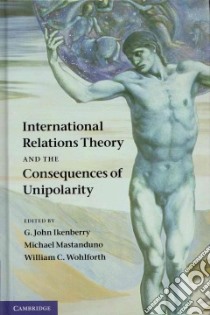International Relations Theory and the Consequences of Unipolarity - 9781107011700
Un libro in lingua di Ikenberry G. John (EDT) Mastanduno Michael (EDT) Wohlforth William C. (EDT) edito da Cambridge Univ Pr, 2011
- € 85.00
- Il prezzo è variabile in funzione del cambio della valuta d’origine
"john ikenberry, michael mastanduno, and william c. wohlforth American primacy in the global distribution of capabilities is one of the most salient features of the contemporary international system. The end of the Cold War did not return the world to multipolarity. Instead the United States - already materially preeminent - became more so. We currently live in a one superpower world, a circumstance unprecedented in the modern era. No other great power has enjoyed such advantages in material capabilities- military, economic, technological, and geographical. Other states rival the United States in one area or another, but the multifaceted character of American power places it in a category of its own. The sudden collapse of the Soviet Union and its empire, slower economic growth in Japan and Western Europe during the 1990s, and America's outsized military spending have all enhanced these disparities. While in most historical eras the distribution of capabilities among major states has tended to be multipolar or bipolar - with several major states of roughly equal size and capability - the United States emerged from the 1990s as an unrivaled global power. It became a "unipolar" state. Not surprisingly, this extraordinary imbalance has triggered global debate. Governments, including that of the United States, are struggling to respond to this peculiar international environment"--
Informazioni bibliografiche
- Titolo del Libro in lingua: International Relations Theory and the Consequences of Unipolarity
- Lingua: English
- Autori : Ikenberry G. John (EDT) Mastanduno Michael (EDT) Wohlforth William C. (EDT)
- Editore: Cambridge Univ Pr
- Collana: Cambridge Univ Pr (Hardcover)
- Data di Pubblicazione: 31 Ottobre '11
- Genere: POLITICAL SCIENCE
- Pagine: 380
- ISBN-10: 1107011701
- EAN-13: 9781107011700


